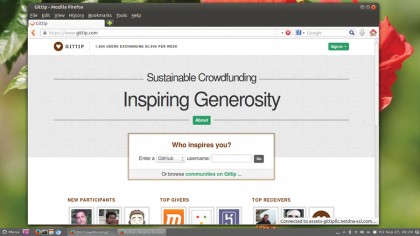The power of crowdfunding: how to make the most of it
Get funding with minimum hassle
Konkel says that at Bountysource its looking to create long-term relationships between developers and backers: "When somebody backs a fundraiser, chances are they'll back a subsequent fundraiser or create a bounty."
Philip Horger who is an active fundraiser at FreedomSponsors, another crowdfunding platform for open source software, shares an interesting experience of this developer-donor engagement. Horger put up a sponsorship to improve the user interface of LibreOffice. A member of the actual development team for LibreOffice showed up and advised that sponsoring such a wide-scope issue was, while an encouraging sign for the developers, not a realistically useful way of making UI improvements. The developer, instead, advised Horger to sponsor more specific improvements, such as the colour picker, etc. "So I broke up my offer among more specific sponsorships. The total sponsorship was the same in the end, but more usefully distributed."
Better than donation

Monetary contributions from users for supporting open source development isn't something new. But crowdfunding is much more gratifying than a simple donation. Horger says that sponsoring on FreedomSponsors is inherently more fine-grained and personal than donations since an offer is tied to a specific and achievable outcome: "You feel that you have stake and a responsibility in that sponsorship's success. It is more gratifying and tangible to be able to point to some distinct feature of some popular program, and say to the person next to you, 'I helped make that happen.'"
Another advantage of platforms, such as FreedomSponsors, according to Horger, that doesn't really make sense for traditional donation is the ability to sponsor one's own projects. It might seem strange at first but as Horger puts it, "there's a method to my madness." "Sponsorships are my way of motivating/rewarding external development, and that includes starting with small stuff. That way, I can foster an active and healthy community of contributors, which not only will take programming and maintenance load off of me in the long run, but also means that my projects can easily live on if I get hit by a bus."
The future of crowdfunding
Like his peers, Tony França of FreedomSponsors is very gungho about the future of crowdfunding and how it will help developers generate funds: "We are witnessing the birth of new businesses powered entirely by the crowd. I believe Crowdfunding will become more and more prevalent as a way to gain access to capital."
Konkel also acknowledges the power of the fundraiser model especially for projects that require upfront capital to achieve economies of scale and where rewards are effectively pre-sales. But he believes that it won't work well for everyone. "We think the future of crowdfunding in open source is a bounty-based model: placing individual bounties on existing bugs and feature requests. Issue trackers can quickly become overwhelming and bounties allow backers to focus development efforts on the issues that matter to them."
Popular crowdfunding platforms
So you've done all the legwork and are ready to approach people for funds. Where do you do it? Do you put up a website and set up the complex infrastructure to process credit cards or Paypal? You could surely do that (see the list of DIY Crowdfunding Platforms), but it's much easier to set up your campaign on an existing platform.
Sign up for breaking news, reviews, opinion, top tech deals, and more.
Using a platform offers several advantages. For one, they have the necessary functionality to carry through your campaign. They'll host all your media and give you the right tools to engage with your audience. You'll also have access to various social media tools to help promote your project.
Also a crowdfunding platform puts your project in front of a crowd that's looking to put up money. Bear in mind that they will all also charge you a different fee for using their service, and some might also ask you to pay the processing fee for the mechanism you use to withdraw the money you've raised. Here's our pick of the current crop.

With almost two decades of writing and reporting on Linux, Mayank Sharma would like everyone to think he’s TechRadar Pro’s expert on the topic. Of course, he’s just as interested in other computing topics, particularly cybersecurity, cloud, containers, and coding.